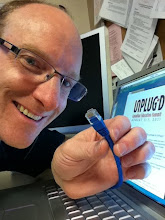Instead of providing a 'presentation-style' workshop, our goal was to leverage easy-to-use collaborative web tools and to lead interested co-learners in the creation of practical, shareable content. Teaching by doing, we did our best to model:
1] how to build relationships among project participants;
2] how to contribute to shared documents simultaneously;
3] how to attribute Creative Commons licensed content;
4] how to offer 'choice' to participants;
5] how to take shared responsibility in creating a product;
6] how to engage remote participants in a meaningful way;
7] how to create and distribute a product for a real world audience.
Field Guide For Change Agents
View more presentations from Rodd Lucier.
"This Field Guide for Change Agents was developed during a workshop at Educon 2.2 in Philadelphia, Pennsylvania in January 30, 2009. As workshop leaders, we were honoured to have participation by educators from around the world, including remote participants who joined us via Elluminate."
The creators have agreed to license their work with an Attribution-Noncommercial-Share Alike 3.0 Creative Commons license. You are free to share or adapt the work, on the condition that the author page and photo attributions are included.
Late addition: One of our online participants, Lorna Costantini, has written a blog post about the experience that really affirms the value of the processes we adopted.








